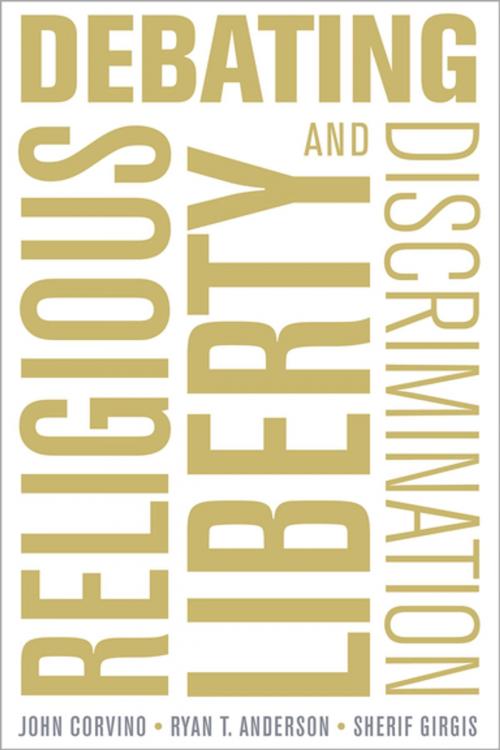Debating Religious Liberty and Discrimination
Nonfiction, Religion & Spirituality, Christianity, Church, Church & State, Philosophy, Religious| Author: | John Corvino, Ryan T. Anderson, Sherif Girgis | ISBN: | 9780190603090 |
| Publisher: | Oxford University Press | Publication: | April 14, 2017 |
| Imprint: | Oxford University Press | Language: | English |
| Author: | John Corvino, Ryan T. Anderson, Sherif Girgis |
| ISBN: | 9780190603090 |
| Publisher: | Oxford University Press |
| Publication: | April 14, 2017 |
| Imprint: | Oxford University Press |
| Language: | English |
Virtually everyone supports religious liberty, and virtually everyone opposes discrimination. But how do we handle the hard questions that arise when exercises of religious liberty seem to discriminate unjustly? How do we promote the common good while respecting conscience in a diverse society? This point-counterpoint book brings together leading voices in the culture wars to debate such questions: John Corvino, a longtime LGBT-rights advocate, opposite Ryan T. Anderson and Sherif Girgis, prominent young social conservatives. Many such questions have arisen in response to same-sex marriage: How should we treat county clerks who do not wish to authorize such marriages, for example; or bakers, florists, and photographers who do not wish to provide same-sex wedding services? But the conflicts extend well beyond the LGBT rights arena. How should we treat hospitals, schools, and adoption agencies that can't in conscience follow antidiscrimination laws, healthcare mandates, and other regulations? Should corporations ever get exemptions? Should public officials? Should we keep controversial laws like the Religious Freedom Restoration Act, or pass new ones like the First Amendment Defense Act? Should the law give religion and conscience special protection at all, and if so, why? What counts as discrimination, and when is it unjust? What kinds of material and dignitary harms should the law try to fight-and what is dignitary harm, anyway? Beyond the law, how should we treat religious beliefs and practices we find mistaken or even oppressive? Should we tolerate them or actively discourage them? In point-counterpoint format, Corvino, Anderson and Girgis explore these questions and more. Although their differences run deep, they tackle them with civility, clarity, and flair. Their debate is an essential contribution to contemporary discussions about why religious liberty matters and what respecting it requires.
Virtually everyone supports religious liberty, and virtually everyone opposes discrimination. But how do we handle the hard questions that arise when exercises of religious liberty seem to discriminate unjustly? How do we promote the common good while respecting conscience in a diverse society? This point-counterpoint book brings together leading voices in the culture wars to debate such questions: John Corvino, a longtime LGBT-rights advocate, opposite Ryan T. Anderson and Sherif Girgis, prominent young social conservatives. Many such questions have arisen in response to same-sex marriage: How should we treat county clerks who do not wish to authorize such marriages, for example; or bakers, florists, and photographers who do not wish to provide same-sex wedding services? But the conflicts extend well beyond the LGBT rights arena. How should we treat hospitals, schools, and adoption agencies that can't in conscience follow antidiscrimination laws, healthcare mandates, and other regulations? Should corporations ever get exemptions? Should public officials? Should we keep controversial laws like the Religious Freedom Restoration Act, or pass new ones like the First Amendment Defense Act? Should the law give religion and conscience special protection at all, and if so, why? What counts as discrimination, and when is it unjust? What kinds of material and dignitary harms should the law try to fight-and what is dignitary harm, anyway? Beyond the law, how should we treat religious beliefs and practices we find mistaken or even oppressive? Should we tolerate them or actively discourage them? In point-counterpoint format, Corvino, Anderson and Girgis explore these questions and more. Although their differences run deep, they tackle them with civility, clarity, and flair. Their debate is an essential contribution to contemporary discussions about why religious liberty matters and what respecting it requires.















